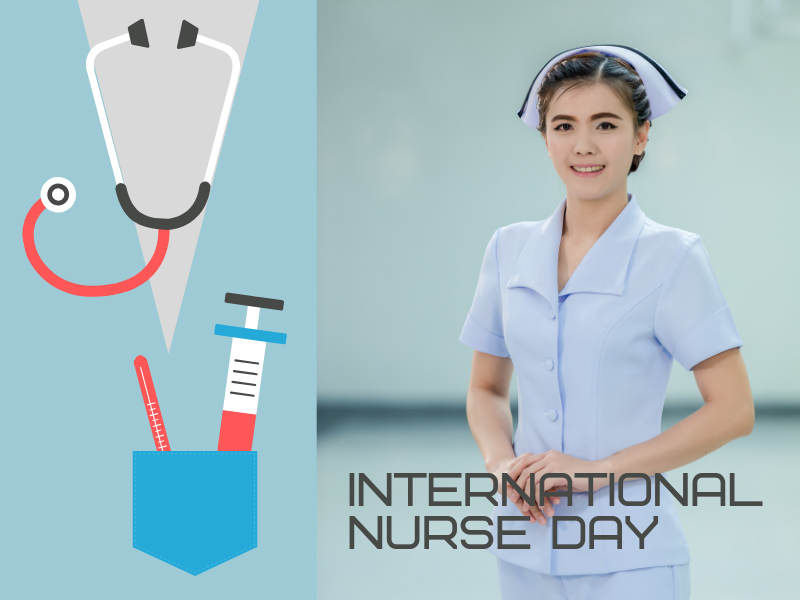The International Nurses Day was celebrated across the world yesterday. Incepted by the International Council of Nurses (ICN), the International Nurses Day is observed every year on May 12 to celebrate the irreplaceable contribution nursing makes to the health and wellbeing of people across the globe and to commemorate the birth of Florence Nightingale, the founder of modern nursing. Florence Nightingale also famously known as the Lady with the Lamp is widely remembered for tending to the wounded soldiers during the Crimean War (1850-56). Since then, the nursing profession has evolved to become a full-fledged healthcare profession which besides providing the traditional hands-on patient care, also discharges the administration and practitioner roles that includes computer and health science. Col. (Rtd.) Binu Sharma, senior vice president nursing services at Columbia Asia Hospitals India and M. Arul Beulah Jasmine, nursing superintendent, Manipal Hospital, Bangalore speaks to our correspondent Odeal D’Souza about nursing as a profession, its challenges, perks and evolution.

Col Binu Sharma
Evolution of nursing
Col (Rtd) Binu Sharma: As the population’s healthcare needs have evolved, so too has the scope of practice for the nurses and midwives. Today the nurses have to be highly trained, well-educated, and have critical thinking skills in order to make complex clinical decisions, which probably 50 years ago would have certainly been made by doctors only.
Technology is also becoming a major factor in the nursing classroom, with nurses learning how to perform complex tasks or handle high-pressure situations through using stimulations. Electronic health records systems are the current trend, making the updated patient data accessible instantly. Non-invasive diagnostic tool have changed how nurses interact with the patients.
M. Arul Beulah Jasmine: When I graduated in 2001 everything was based on manual skills whereas now it’s digitally advanced with the latest technologies. Examples are: mercury thermometer versus digital thermometer, mercury BP apparatus versus digital BP monitors, vein detectors, positioning of patients are done manually versus remote positioning and treatment centric versus patient /attender centric.
Demand for nursing professionals
Col (Rtd) Binu Sharma: The demand for nursing professionals is changing with the evolving times where patients are becoming better informed, their expectations are increasing and legal suits are on the rise.
M. Arul Beulah Jasmine: The demand is on the rise for the highly experienced and skilful nursing leaders but not for the junior nurses; the reason could be poor recognition and migration of nurses to overseas for better job prospects.
Challenges involved
According to Col (Rtd) Binu Sharma, the main challenges involved in the nursing profession are:
Long working hours – Hospitals usually have long work hours and require nurses to work in long shifts. Sometimes, nurses are also assigned back-to-back shifts.
Exposure to hazardous chemicals – Nurses are constantly exposed to hazardous chemicals and materials that can be harmful for their health. These harmful chemicals include cleaning agents, medications, radiations and many others.
Exposure to diseases – Since the nurses are responsible to look after the patients, they are always at the risk of being exposed to various diseases and hence the nurses should explore new strategies to help identify the potential seriousness of workplace injuries and illnesses.
Shortage of the nursing staff — Due to the increasing demand for nurses, the nurse to patient ratio still remains unbalanced. While the number of patients is increasing day by day there is an acute shortage of nurses to attend the patients.
Arul Beulah Jasmine
M. Arul Beulah Jasmine says, “The big challenge is a nurse-patient ratio where many a times the need of the patient should be the category to decide on nurse-patient ratio. The demand from the critical patients and their relatives always differs from the non-critical ones in the ward locations. This is the disadvantage of being advanced, more to do with system related work and that takes lot of time.”
Financial prospects
Col (Rtd) Binu Sharma: A committee set up by the Indian Nursing Council has mandated that nurses working in private hospitals be paid on a par with those employed in state government hospitals. The plight of the private sector nurses can be imagined from the fact that they barely take home a fraction of what nurses in the government sector earn. The new recommendation covers every healthcare facility – from the stand-alone hospitals to tiny nursing homes to large chains and brands. The first recommendation is that the base wage will be a minimum of Rs 20,000 a month.
M. Arul Beulah Jasmine: Comparatively, the financial prospects are better, but it can be improved as the utilisation of physical energy and the critical thinking at each touch points plays a vital role. Also, the constant demand from patients can sometimes be stressful.
Message on International Nurses Day 2019
Col (Rtd) Binu Sharma: It is a profession which requires strong dedication to service and wellbeing of others. Nurses quell the feelings of fear and provide security and necessary care to patients and support physicians in discharging their duties. Thanks to their care, the patients are able to recover their health. We know that only drugs cannot help a patient’s recovery but the care, hospitality and joy radiating from our nurses matter too. Their words of encouragement reach the patients hearts and lift their spirits. For them there is no greater satisfaction than seeing their patients recover and resume a normal life.
M. Arul Beulah Jasmine: Be connected with love and warmth. Since it is a noble profession, don’t get fascinated with money because the satisfaction you get when you are revered by patients doesn’t match with anything in the world. Stay updated.
